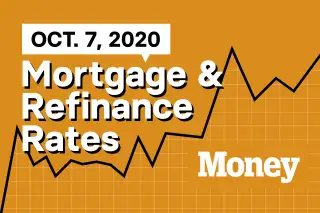Here Are Today's Best Mortgage & Refinance Rates for October 7, 2020

The average rate for a 30-year fixed-rate purchase mortgage was 3.461% Tuesday. The average rate for a 30-year refinance was 4.327%.
Money's current mortgage rates include data from 8,000 lenders across the United States and are updated daily. The rates include points and represent what a borrower with a 20% down payment and 700 credit scores — roughly the national average FICO score — would have been quoted.
| 30-year fixed-rate purchase mortgage |
| 3.461% |
| Rate of October 6, 2020 |
Mortgage rates vary from state to state. On Tuesday, borrowers in Alaska were quoted the lowest mortgage rates — at 3.247%. People looking for mortgages in Alabama saw the highest average rate at 3.674%. Nationwide, borrowers with the highest credit scores, 740 and above, were quoted rates averaging 3.009%, while those with credit of 640 or below were shown rates of 4.725% — a 1.751 percentage-point spread.
You may be able to negotiate a lower rate if you shop around or if you have other accounts with the lender. (Money's picks for the best mortgage lenders are here.) Currently, some banks are hiking up advertised rates to keep demand in check, so you may be offered a lower rate if you reach out directly.
Freddie Mac's widely quoted Primary Mortgage Market Survey put rates at 2.88% with 0.8 points paid for the week ending October 1. The mortgage purchaser's weekly survey reflects borrowers who put 20% down on conforming loans and have excellent credit.
Refinance rates today
Money's survey also shows that the offered rate for a 30-year refinance for someone with a 740 credit score was 3.665% on Tuesday. Last October, the average mortgage rate (including fees) was 3.859%.
| 30-year fixed-rate mortgage refi |
| 3.665% |
| Rate of October 6, 2020 |
A homeowner with a $200,000 mortgage balance currently paying 3.859% on a 30-year loan could potentially cut their monthly payment from $939 to $917 by financing at the current lower rates. To determine if it's worth it to refinance your mortgage, also consider the closing fees you paid on your current mortgage, how much your new lender is charging and how long you have left on your loan term. (Our picks for the best lenders for refinancing are here).
What else is happening in the housing market right now?
The volume of mortgage applications increased 4.6% for the week ending October 2, according to the Mortgage Bankers Association. Purchase loan applications increased 1% week-over-week and were 21% higher than the same week last year, while refinance loan applications were up 8% week-over-week and 50% from a year ago. Refinances continue to make up the largest share of loan applications at 65% of total volume.
Heavy demand is pushing home prices up. The average loan balance reached a new record of $371,500, according to the MBA.
"There are signs that demand is waning at the entry-level portion of the market because of supply and affordability hurdles, as well as the adverse economic impact the pandemic is having on hourly workers and low-and-moderate income households," said Joel Kan, the MBA's senior vice president of economic and industry forecasting. "As a result, the lower price tiers are seeing slower growth, which is contributing to the rising trend in average loan balances."
The housing market may be getting a little tighter as millennial buyers are planning on taking advantage of record-low mortgage rates and speeding up their plans to purchase a home within the next year, according to a survey by Realtor.com.
Nearly half of the respondents indicated they were pushing up their plans to purchase a home because of the pandemic. Seventy-five percent of the respondents indicated that they had been working from home since the pandemic began, and 63% of those indicated the reason they plan to purchase a home is because of the ability to work remotely. Shelter in place orders have allowed most of the millennials surveyed, 68%, to save more money for a down payment.
"If there is any silver lining to the current economic landscape, it's that mortgage rates are hanging around record lows. With little to no equity to leverage, millennial home buyers tend to take out larger loans. Historically low rates are making this more manageable, even with rising home prices," said Danielle Hale, chief economist at Realtor.com. "Additionally, shelter-in-place orders helped many who were fortunate enough to keep their jobs save for a down payment -- one of the largest hurdles of buying a home. The combination of low rates and the opportunity to save is enabling many millennials to move up their home buying timeline."
Millenials, born between 1981 and 1997, currently make up the largest generation in the country and have been the dominant buying force in the market for the last five years. The survey was conducted during the month of June and polled 2000 shoppers who were planning on purchasing a home with the year.
Quote of the Week
Andrew Weinberg, principal and mortgage loan originator at SilverFin Capital:
The safest thing you can do when drawing on your home equity is to get your loan into a 30-year fixed product. don't kick the can down the road."
For more information on home equity, read: Home Equity is Soaring - if You're Tempted to Borrow Against Your Home, Read This First.
Procrastinators, It's Not Too Late to Refinance Your Mortgage and Save Thousands
Everyone Wants to Buy a House Right Now. 9 Experts Predict How Long Demand Will Soar
Get to Know the 'Leaseback,' the Pandemic House Selling Trend Where no Move Is Required